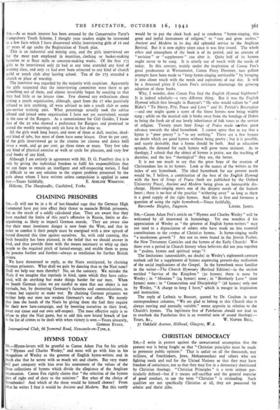SIR,—Canon Adam Fox's article on "Hymns and Charles Wesley" will
be welcomed by all interested in hymnology. Yet one wonders if his appreciation of Wesley as "the greatest of English hymn-writers" may not tend to a depreciation of others who have made no less essential contributions to the corpus of Christian hymns. Is hymn-singing really "a mushroom growth "? Are not its roots found in the Jewish Psalter, the New Testament Canticles and the hymns of the Early Church? Was there ever a period in Church history when believers did not join together in "psalms, hymns and spiritual songs "?
The limitations (unavoidable, no doubt) in Wesley's eighteenth-century outlook call for a supplement of hymns expressing present-day realisation of the social implications of the Gospel. In the hymnbook most familiar to the writer—The Church Hymnary (Revised Edition)—in the section entitled "Service of the Kingdom" (30 hymns) there is none by Wesley ; in " Missions " (24 hymns) none ; in "Brotherly Love" (nine hymns) none ; in "Consecration and Discipleship" (28 hymns) only one by Wesley, "A charge to keep I have," which is meagre in inspiration and instruction.
The reply of Leibniz to Bossuet, quoted by Dr. Coulton in your correspondence columns, "We are glad to belong to this Church that is
always moving and eternally variable." seems apposite in 'elation to the Church's hymns. The legitimate fear of Pantheism should not lead us to overlook the Pantheism that is an essential note of sound theology.—
Yours, &c., W. NAPIER BELL. 37 Oakfield Avenue, Hillhead, Glasgow, W.2.


























 Previous page
Previous page